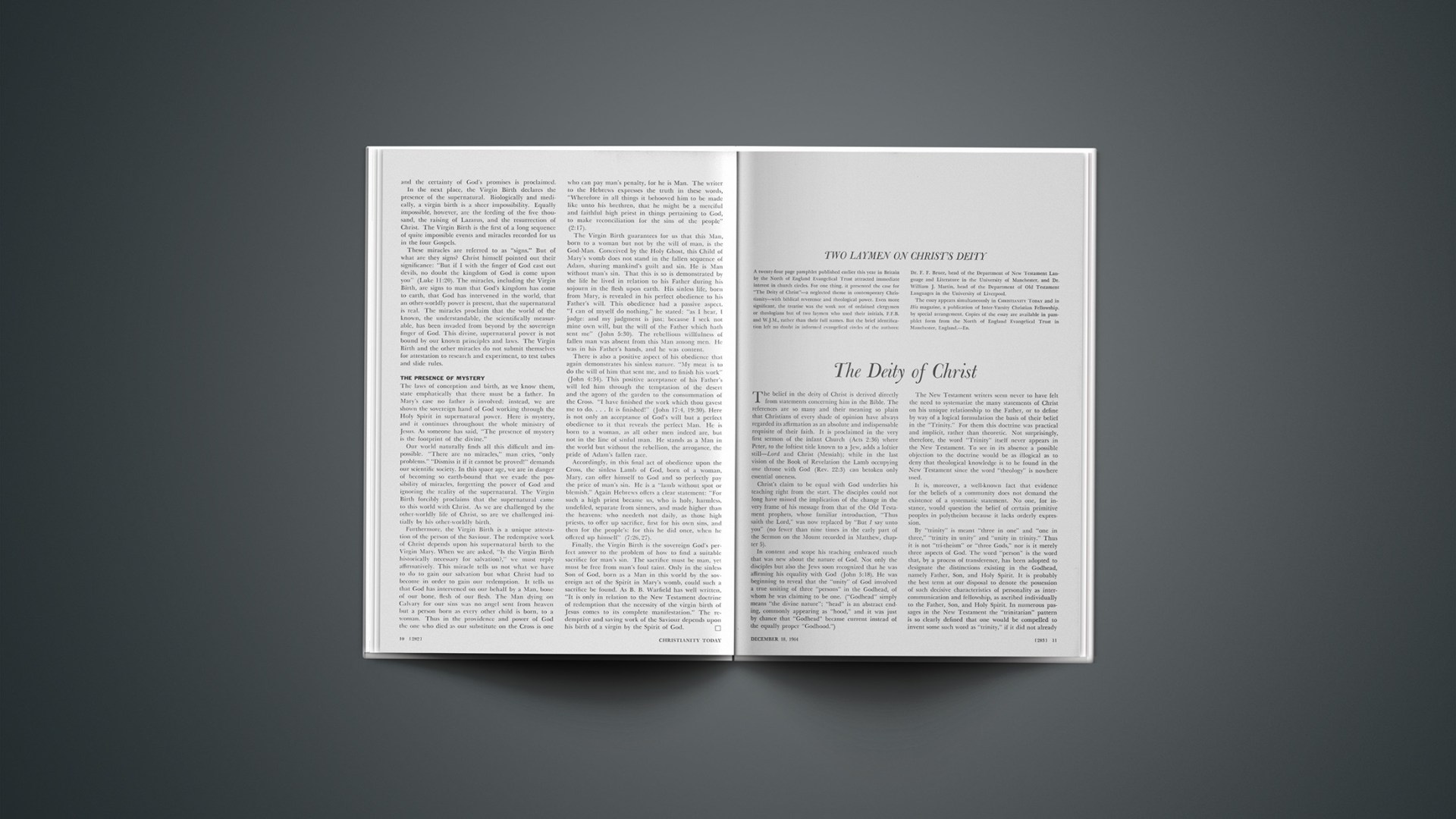The belief in the deity of Christ is derived directly from statements concerning him in the Bible. The references are so many and their meaning so plain that Christians of every shade of opinion have always regarded its affirmation as an absolute and indispensable requisite of their faith. It is proclaimed in the very first sermon of the infant Church (Acts 2:36) where Peter, to the loftiest title known to a Jew, adds a loftier still—Lord and Christ (Messiah); while in the last vision of the Book of Revelation the Lamb occupying one throne with God (Rev. 22:3) can betoken only essential oneness.
Christ’s claim to be equal with God underlies his teaching right from the start. The disciples could not long have missed the implication of the change in the very frame of his message from that of the Old Testament prophets, whose familiar introduction, “Thus saith the Lord,” was now replaced by “But I say unto you” (no fewer than nine times in the early part of the Sermon on the Mount recorded in Matthew, chapter 5).
In content and scope his teaching embraced much that was new about the nature of God. Not only the disciples but also the Jews soon recognized that he was affirming his equality with God (John 5:18). He was beginning to reveal that the “unity” of God involved a true uniting of three “persons” in the Godhead, of whom he was claiming to be one. (“Godhead” simply means “the divine nature”; “head” is an abstract ending, commonly appearing as “hood,” and it was just by chance that “Godhead” became current instead of the equally proper “Godhood.”)
The New Testament writers seem never to have felt the need to systematize the many statements of Christ on his unique relationship to the Father, or to define by way of a logical formulation the basis of their belief in the “Trinity.” For them this doctrine was practical and implicit, rather than theoretic. Not surprisingly, therefore, the word “Trinity” itself never appears in the New Testament. To see in its absence a possible objection to the doctrine would be as illogical as to deny that theological knowledge is to be found in the New Testament since the word “theology” is nowhere used.
It is, moreover, a well-known fact that evidence for the beliefs of a community does not demand the existence of a systematic statement. No one, for instance, would question the belief of certain primitive peoples in polytheism because it lacks orderly expression.
By “trinity” is meant “three in one” and “one in three,” “trinity in unity” and “unity in trinity.” Thus it is not “tri-theism” or “three Gods,” nor is it merely three aspects of God. The word “person” is the word that, by a process of transference, has been adopted to designate the distinctions existing in the Godhead, namely Father, Son, and Holy Spirit. It is probably the best term at our disposal to denote the possession of such decisive characteristics of personality as intercommunication and fellowship, as ascribed individually to the Father, Son, and Holy Spirit. In numerous passages in the New Testament the “trinitarian” pattern is so clearly defined that one would be compelled to invent some such word as “trinity,” if it did not already exist, to describe the implications of the statements.
It was not until the Gospel had been preached for some three hundred years in New Testament terms that anyone took on himself to assail the belief of Christians in the deity of Christ. The person who did it was Arius. The novel form of his attack shows that Christians had hitherto accepted it without question. His arguments, as formulated by him, were clearly intended as an objection to the prevalent view, not as a correction of a heresy. If the state of affairs had been otherwise, that is, if Christians generally had denied the deity of Christ, then his opposition would have been meaningless. As promotion to a bishopric had been denied him, he has left himself wide open to the suspicion of having been motivated by a desire for personal revenge. He was evidently a man who knew how to exploit secular political influence to the full, and the story of his machinations makes sordid reading. As a consequence of strong political support, a controversy arose out of all proportion to the merits of his arguments. His views were finally shown to be at complete variance with Scripture and were pronounced heretical. Nevertheless, from time to time they have been revived, either deliberately or in ignorance, often peddled from door to door by text-mongers, unaware that the very passages which they have learned to quote so glibly were first used over sixteen hundred years ago by a frustrated “cleric.”
Within the brief compass of this booklet it will not be possible to quote all the passages referring to the deity of Christ and to consider all the ways in which this truth is indicated in Scripture. The reader should, however, find no difficulty in adding to the references given here. In the passages quoted, the original text has been kept constantly under review, and on occasion wording not to be found in any standard translation has been introduced, where it was felt that the meaning of the original could be made more apparent. In the section that immediately follows, the evidence is all the stronger for being of an incidental nature.










